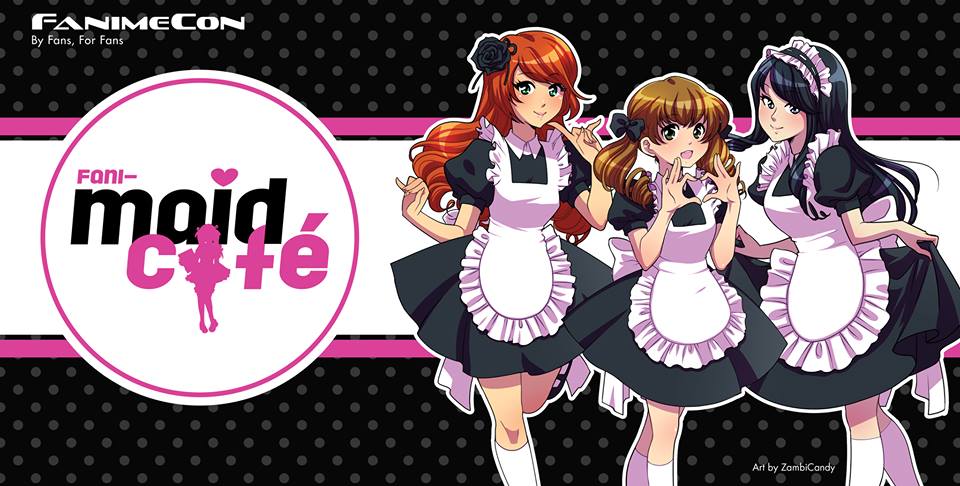In this two-part series, Fanimaid veteran Jessica Fong takes Around Akiba into the maid scene in the USA.
FanimeCon’s biggest attractions: Fanimaid Cafe

It’s Saturday morning of FanimeCon in San Jose, California – the busiest morning of the convention. Inside the Fairmont Hotel’s opulent Club Regent dining room, a block away from the convention center, girls smile and curtsy in classic moe maid outfits. This is the home of one of FanimeCon’s biggest attractions: Fanimaid Cafe.
Modeled off the popular themed eateries of Akihabara legend, Fanimaid Cafe celebrated its 10th anniversary this year. Like many other maid cafes in the US, Fanimaid functions like a pop-up event hosted under the umbrella of an anime convention. Most of the maids are young women who work or go to school; for them, this cafe is a special event where they can enjoy moe-kei and hang out with like-minded friends. Their simple, conservative black-and-white outfits feature knee-length skirts, flouncy petticoats, and the sort of puffed sleeves and ribbons that would send Anne Shirley into raptures. Fluffy, kawaii, pastel accessories are everywhere. Some maids even add cosplay elements – this year alone, there are two girls whose outfits are themed around characters from the popular anime Kobayashi-san’s Dragon Maid. One of the staff members spends Saturday in a cosplay of Becky from Persona 5, whose maid outfit – in a stroke of serendipity – aligns exactly with the cafe’s strict uniform rules.
There’s still time to play games and enjoy snacks at our @FanimaidCafe (located in the Club Regent of the Fairmont San Jose, closes at 6pm)! pic.twitter.com/j9e6vZyZKN
— FanimeCon (@FanimeCon) May 29, 2017
After ten years in operation, the flow of the cafe is smooth and well-oiled. In the manner of the most classic maid cafes, Fanimaid’s concept is that of a mansion owned by the patrons (who the maids referred to as goshujinsama and ojousama, masters and mistresses), who are returning home to enjoy a meal with their maid staff. As such, when a party of guests enters, they are greeted by a line of maids bowing and welcoming them home (“okaerinasaimase”) in Japanese. After purchasing their food, guests are seated at round tables decorated simply with colorful handmade centerpieces. For approximately 45 minutes, they eat, chat, and play board games with their assigned maid. Occasionally there are emceed games of Pictionary or jan-ken-pon (the Japanese version of rock-paper-scissors) wherein all the tables compete, or short J-pop performances by the maids. At the end of the experience, guests are led to the photo corner, where a professional photographer takes polaroids and cell phone pictures of their group. Finally, they are taken to the exit, where the maids bow and bid them goodbye.
Pics of yesterday’s Fanimaid LIVE show from the maids of @FanimaidCafe! #Fanime pic.twitter.com/pxtKthuvZU
— FanimeCon (@FanimeCon) May 29, 2017
American Maid Cafes vs. Japanese Maid Cafes
Cultural and practical obstacles have both hindered and shaped the cafe’s growth, making it quite different in some ways from its Japanese counterparts.
“[We] are unable to touch the food and mix drinks for patrons due to food safety laws in the United States, whereas a main part of the maid cafe experience in Japan is to have the maid draw cute shapes with sauce on your plate, add flavoring to your coffee, or mix an alcoholic drink in front of you,” says staff member Ling (27).
“Our [Japanese] phrasing [when greeting guests] is spotty in general, and we don’t do food charms as often,” adds fellow staffer Keiko (27). (“Food charms” are short, cute spells some Japanese maids say “to make patrons’ food taste better.”)
Akihabara’s moe maid cafes are a fairly well-known phenomenon amongst anime fans these days, but awareness of their American counterparts is still growing. Fanimaids tell stories every year of attendees who walk into the cafe after an interminable wait only to ask, “Wait, so what exactly is this again?” Even amongst in-the-know otakus, misconceptions abound about the types of services maid cafes provide.
“I want everyone to know that maid cafes are intended as a family-friendly environment,” says Tiffany (23), a veteran maid. “Authentic, traditional maid cafes do not have sexual acts and can be enjoyed by all ages, all genders… [they] are the Japanese otaku’s way of feeling [non-sexual] intimacy and feeling like they have a friend that cares. Plus they get to see cute girls, eat cute food and see cute performances!”
Thank you for visiting the @FanimaidCafe, goshujin-sama! #Fanime pic.twitter.com/0tvQZHWtl3
— FanimeCon (@FanimeCon) May 29, 2017
Check out the Fanimaid Cafe’s official Facebook and Twitter for more information.
(In part II, Around Akiba will step into the American maid experience.)